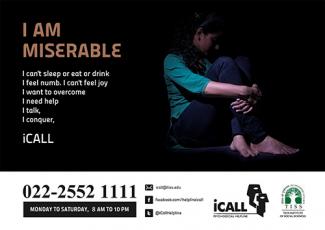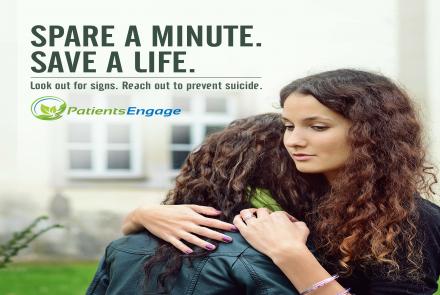
विश्व आत्महत्या रोकथाम दिवस (वर्ल्ड सुसाइड प्रिवेंशन डे) के अवसर पर, पारस शर्मा, प्रोग्राम कोऑर्डिनेटर, आइकॉल साइकोसोशल हेल्पलाइन, टाटा इंस्टीट्यूट ऑफ सोशल साइंसेज (TISS) आत्महत्या के बारे में कुछ आम गलतफहमियों को दूर करते हैं।
1. जो लोग आत्महत्या के बारे में बात करते हैं, वे आमतौर पर आत्महत्या नहीं करते हैं, वे केवल ध्यान आकर्षित करना चाहते हैं।
आत्महत्या मदद की एक ऐसी पुकार है जिसपर किसी ने ध्यान नहीं दिया है। यह सोचना गलत है कि जो लोग सचमुच अपने जीवन को समाप्त करना चाहते हैं वे स्पष्ट रूप से इस इरादे को व्यक्त नहीं करते हैं और जो लोग आत्महत्या करने की बात करते हैं वे आत्महत्या नहीं करेंगे। इस बात की पुष्टि के लिए पर्याप्त शोध है कि आत्महत्या करने वाले व्यक्ति कई तरह से ये व्यक्त करते हैं कि वे निराशाजनक और असहाय महसूस कर रहे हैं, और वे मदद प्राप्त करने का प्रयास भी करते हैं। आत्महत्या करने की स्थिति पर अकसर वे सिर्फ तब आते हैं जब कोई भी सहारा मिलने के रास्ते उन्हें नजर नहीं आते और उन्हें लगता है कि अब तो उनके लिए आत्महत्या ही सबसे अच्छा विकल्प है।
2. आत्महत्या का प्रयास करने वाले लोग जरूर पागल होंगे।
डब्ल्यूएचओ (WHO) के 2014 प्रकाशन, “प्रिवेंटिंग सुसाइड: ए ग्लोबल इम्पीरेटिव” के अनुसार, भारत जैसे देश में केवल 60% आत्महत्याओं के लिए किसी नैदानिक और उपचार योग्य मानसिक बीमारी को जिम्मेदार ठहराया जा सकता है। शेष 40% आत्महत्याएं भारत के विशिष्ट मनोसामाजिक और सांस्कृतिक वास्तविकताओं का परिणाम हैं। यानि कि, 40% मामलों में,आत्महत्या किसी मानसिक बीमारी के कारण नहीं होता है। यहां तक कि जो लोग मानसिक बीमारी से पीड़ित हैं और जिन्होंने आत्महत्या का प्रयास करा है पर उसमें विफल रहे, उन्हें उस विफल प्रयास के बाद भी अन्य लोगों के हाथ नुकसान पहुँचने की संभावना है। मानसिक बीमारी से पीड़ित सभी लोगों में सिर्फ कुछ में ही आत्मघात की इच्छा (आत्महत्या की प्रवृत्ति) होती है। आत्मघात की इच्छा वाले सब लोग किसी मानसिक बीमारी से पीड़ित नहीं होते हैं। वास्तव में, अध्ययनों से पता चला है कि जो लोग नैदानिक रूप से अवसाद के ग्रस्त हैं, वे अन्य लोगों (जो नैदानिक रूप से डिप्रेस्ड नहीं हैं) की तुलना में दुनिया और स्थितियों का अधिक सटीक मूल्यांकन करते हैं । इसे 'डिप्रेसिव रियलिज्म' भी कहा जाता है, जिसका मूल रूप से मतलब यह है कि जो लोग चिकित्सकीय रूप से डिप्रेस्ड नहीं होते हैं, वे अधिक आशावादी होते हैं, चाहे उनका इस तरह से आशावाद होना स्थिति के अनुरूप न हो। वे स्थितियों का गलत मूल्यांकन करते हैं, परन्तु अवसाद वाले व्यक्ति स्थितियों को ठीक से भांप पाते हैं और वास्तविकता देख पाते हैं।
3. आत्महत्या का प्रयास करने वाले व्यक्ति वे लोग हैं जो मदद नहीं खोजना चाहते थे।
4. आत्महत्या के बारे में चर्चा करने से लोग खुद आत्महत्या करने के बारे में सोचने लगेंगे। चर्चा उन्हें आत्महत्या करने के लिए उकसा सकती है।
यह एक बहुत ही आम गलत धारणा है। अफ़सोस, कई डॉक्टर और मानसिक स्वास्थ्य चिकित्सक भी ऐसा सोचते हैं। सच तो यह है कि आत्महत्या के बारे में बात करने से और “आत्महत्या” शब्द का उपयोग करने से संबंधित व्यक्ति को लगता है कि आप उनके साथ इस विषय पर बात करने के लिए तैयार हैं, और वे इस विषय पर आपके साथ खुल कर बात कर सकते हैं। उन्हें यह भी लगता है कि कोई हितैषी है जो उनके बारे में सोच रहा है और यह पूछने के लिए तैयार है कि क्या वे कैसा महसूस कर रहे हैं। मेरे अनुभव में, ऐसे अधिकाँश लोग जो आत्महत्या के बारे में सोच रहे हैं, वे इस इंतज़ार में हैं कि कोई उनकी भावनाएं पहचाने और उनके बारे में उनसे पूछे जिस से उन्हें लगे कि उनकी भावनाएं वैध हैं और वे खुल कर अपने ख़याल व्यक्त कर सकते हैं।
5. आत्महत्या का जोखिम किशोरावस्था में अधिक है।
यह धारणा सच है। किशोर, विशेषकर 15-24 वर्ष की आयु की लड़कियों का आत्महत्या करने की चपेट में आने का ख़तरा सबसे अधिक माना जाता है। किशोर लड़कों में सफल आत्महत्या की दर अधिक है, क्योंकि उनकी मर्दानगी की भावना उन्हें आत्महत्या के लिए अधिक क्रूर और घातक साधनों का उपयोग करने के लिए प्रेरित करती है, जबकि किशोर लड़कियों में यह संभावना है कि वे अनेक प्रयास करेंगी, पर उनके प्रयास कम घातक किस्म के होंगे।
6. आत्महत्या का कारण हमेशा डिप्रेशन ही होता है
7. अधिकाँश आत्महत्या के प्रयास विफल होते हैं
भारत जैसे देश में कितने आत्महत्या के प्रयास किए जाते हैं, इसका कोई विश्वसनीय अनुमान नहीं उपलब्ध है। आत्महत्या का प्रयास विफल होने पर अधिकांश लोग अपने इस विफल प्रयास के बारे में किसी रिपोर्टिंग प्राधिकरण को नहीं बताते हैं। अधिकाँश ऐसे आत्महत्या के प्रयास के केस जो अस्पतालों में पहुँचते हैं वे विभिन्न कारणों से “आत्महत्या” के केस के रूप में रिपोर्ट नहीं किए जाते हैं। कभी-कभी असफल आत्महत्या के प्रयास के बाद आपातकालीन कक्ष में व्यक्ति को पहुंचाने के बाद परिवार वालों को पुलिस को चुप रहने के लिए घूस देने के लिए मजबूर किया जाता है, क्योंकि आईपीसी की धारा 309 में आत्महत्या के प्रयास को अपराध माना जाता है। कभी-कभी मेडिको-लीगल सिस्टम में, अगर चिकित्सक आत्महत्या का आकलन करने में कुशल नहीं हैं, तो आत्महत्या के प्रयासों को 'दुर्घटना' के रूप में सूचित किया जाता है।
लेकिन विभिन्न अनुमान हमें बताते हैं कि प्रत्येक रिपोर्ट की गई आत्महत्या के लिए दस और ऐसे केस हैं जो आत्महत्या की श्रेणी में रिपोर्ट नहीं करे गए हैं। इसलिए हम यह मान सकते हैं कि अधिकाँश आत्महत्या के प्रयास विफल रहते हैं। परन्तु इसके लिए किसी के पास कोई विश्वसनीय आंकड़ा नहीं है।
8. सप्ताहांत पर आत्महत्याएं अधिक आम हैं
अगर हम यह मानें कि छुट्टी या सप्ताहांत में यह संभावना अधिक है कि लोग अपने परिवार के सदस्यों या दोस्तों के आसपास होंगे, तो औरों के साथ रहने का एक सुरक्षात्मक असर होगा - न कि उसका विपरीत - और ऐसे दिनों में आत्महत्या की संभावना अन्य मौकों के मुकाबले कम होगी। यह एक मीडिया-निर्मित गलत धारण है कि आत्महत्या की संख्या में कुछ मौसम में तीव्र बढ़ौती होती है, या नव वर्ष की पूर्व संध्या पर या दिवाली, वेलेंटाइन डे आदि पर आत्महत्या का दर अधिक होता है। कम से कम मैंने तो इसे अपने काम में नहीं देखा है।
9. क्या कोई “सुसाइड जीन” ’है जिस से आत्महत्या का जोखिम अधिक होता है?
मेरी जानकारी में तो नहीं। आत्महत्या का अनेक कारकों के साथ साथं मौजूद होने से सम्बन्ध है - व्यक्ति की बायो-साइको-सोशल (शारीरिक, सोच संबंधी और सामाजिक) स्थिति में कठिनाइयां और असहाय होने की भावना और साथ ही ऐसी परिस्थितियाँ जो आत्महत्या करने के विचार को पनपने देती हैं और आत्महत्या करने के अधिक मौके प्रस्तुत होते हैं। ऐसी कोई विशिष्ट जीन नहीं है जो आत्महत्या का कारण बन सकती है।
10. हेल्पलाइन आत्महत्याओं को रोकने में मदद कर सकती हैं
हेल्पलाइन, संकट केंद्र, सहकर्मी सहायता समूह, ऐसे केंद्र जहां कोई भी आ सकता हैं (ड्राप-इन सेंटर्स), ऑनलाइन फोरम, इत्यादि - ये सभी आत्मघाती व्यक्तियों के लिए उत्कृष्ट सहायक तंत्र के रूप में काम करते हैं।
हेल्पलाइन संपर्क
आइकॉल हेल्पलाइन नंबर: + 91-22-2552 1111 (8 सुबह -10 रात्रि, सोम-शनि)
आइकॉल ईमेल आईडी: icall@tiss.edu
चैट: nULTA ऐप
कुछ मुद्दे जिन में आइकॉल मदद करने की कोशिश करता है: अधिकारों का उल्लंघन, रिश्तों की समस्याएं, भय, बच्चों के पालन-पोषण से संबंधी चिंताएं, अवसाद और उदासी की भावनाएं, दुर्व्यवहार और हिंसा, कामुकता और लिंग से संबंधित मामले, बांझपन और गर्भ धारण संबंधी मुद्दे, वैवाहिक समस्याएं, वरिष्ठ नागरिकों के मामले, संघर्ष, चिंता, आत्मघाती विचार, कार्यस्थल सम्बंधित तनाव, दिमागी परेशानी जो टर्मिनल बीमारी और लत से उत्पन्न होती है। यह हेल्पलाइन कैरियर और अकादमिक परामर्श भी प्रदान करती है।
















